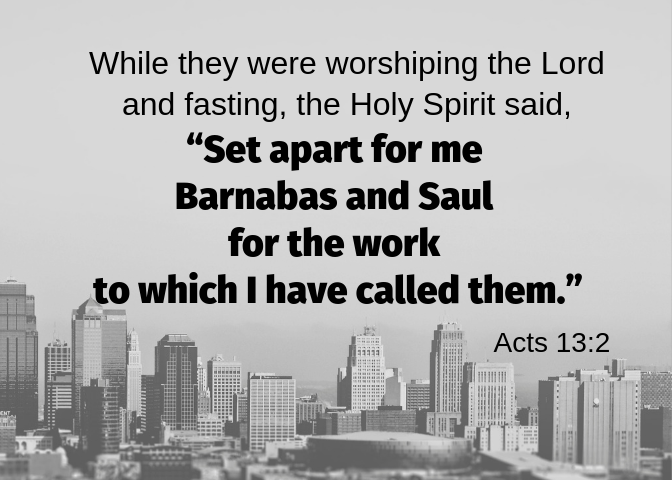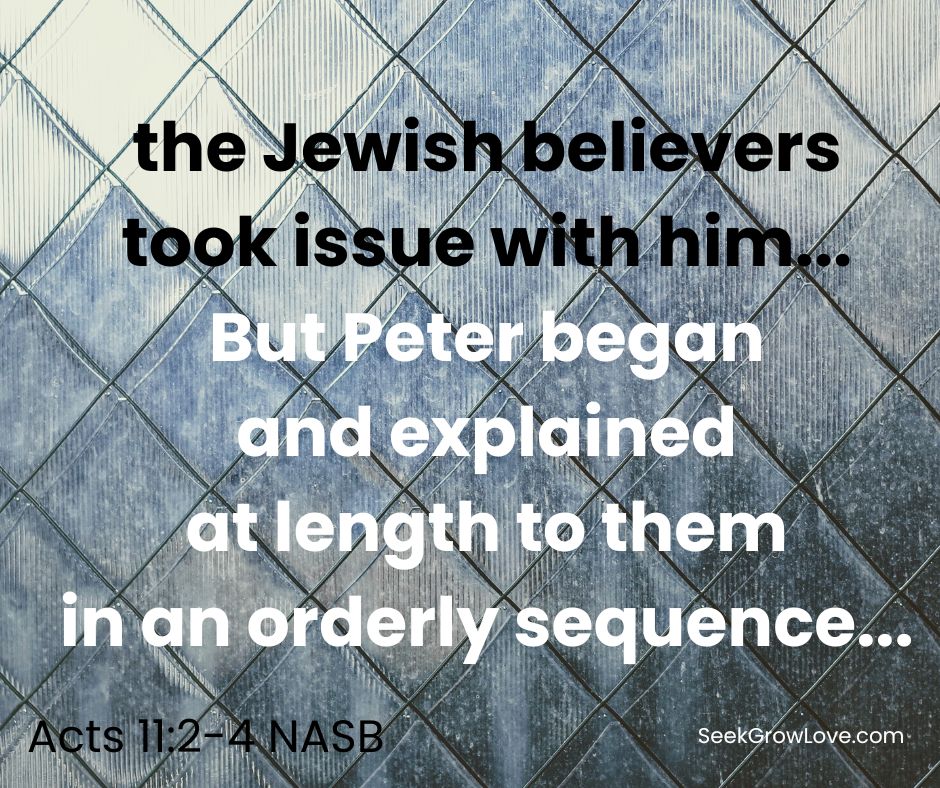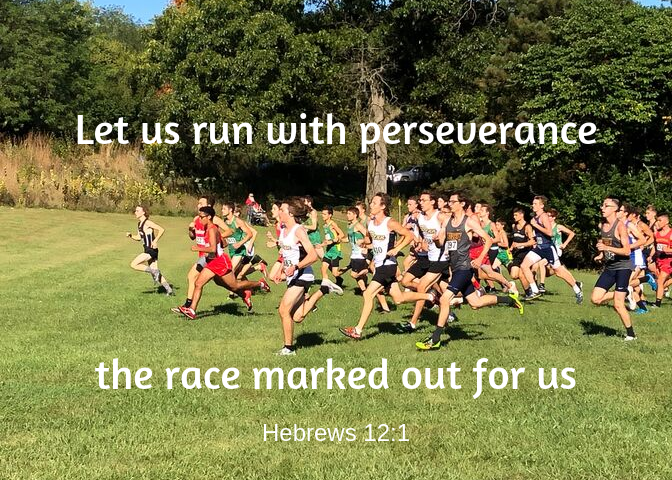
Galatians 4-6
Devotion by Juliet Taylor (Tennessee)
Prior to the New Covenant, the Jews were like slaves to the law, in the sense that children are slaves to their parents’ rules until the time has come to set them free to do what they’ve learned is right without their parents’ involvement. This is what Paul is trying to reiterate regarding the Law of Moses and the Law of Christ/law of liberty to the Galatians.
When Jesus ratified a new covenant with them (and us), the Jews were set free from the Law of Moses in the same manner that a child is set free from her parents’ rules/laws once she becomes an adult. Because Jesus came, the Jews are now free to walk by faith like Abraham did, without a law to teach him what to do, but with God’s wisdom about what to do, having already learned what is good from their “childhood.”
To make this point clearer, think of the things you still do as an adult because your parents taught you well when you were a child, like holding the door for the person behind you, or waiting patiently for your turn while in line, etc. They’re not things that you’re doing because you’re still under your parents’ rules and will receive consequences from them if you don’t (or do). They’re things you’re doing because they’re ingrained in you to do from their discipline of you, and because you’ve learned that they are good practices to help you live well (to keep yourself and others from harm and to do good to others).
If you engage in the good things your parents taught you once a “free to do as you please” adult, you will probably do well in life. If not, you will understand that you’re not really free, you’re just not under your parents’ authority anymore. They’re not going to be the ones providing you with consequences for your actions because you’re not under their yoke. You’re under a free society’s yoke – one that obviously still expects you to do what’s right so that you won’t harm yourself or others.
And there will be some behaviors that you’re no longer expected to engage in in your free society, such as not talking to strangers. Though your parents may have taught you to heed this rule when you were under their yoke to keep you from harm, it no longer applies in your free society. The opposite is actually expected for love and respect’s sake.
If they (and we) now identify in Christ, they are free from the Laws of Moses (free from their “parent” Moses’s rules), its consequences, and its authority. They are adults, free to serve God without specific laws about how they must live, beyond what their new authority Jesus says to do, which is to love as Jesus loved, giving the world the royal treatment (love your neighbor as yourself).
What’s ingrained in a Christ follower is the Holy Spirit, not the laws from the Law of Moses. It is the Spirit that writes the law (of Christ) on our heart, urging us to do what pleases God. If we (both Jew and Gentile) listen to the urging of the Spirit, we are walking by the Spirit and pleasing God. If not, we’re walking by the flesh and pleasing ourselves (sinning/choosing our own will).
We will reap what our behavior sows in the end, either to the flesh, which leads to death, or to the Spirit, which leads to life. Jesus, our authority under the New Covenant, will be our judge.
So, how have you been doing in loving God and loving people?
If you don’t know how to love like Jesus, ask God for his wisdom about how to love your neighbor (and God), or what actions you should take to love them. His desire is to give you his wisdom about what to do when you ask.
First Corinthians 1:30 says that Jesus has become wisdom for us, so look to him for wisdom; look at his words to help you to know what God’s will is. Look at the people that Jesus entrusted God’s word with, like Paul. At the end of almost all of his letters, he gives those he’s writing to some practical application in how to love like Jesus. James gave us a lot too!
The more we follow the urging of the spirit to do God’s will, the more we become like Christ and will do God’s will. Becoming this type of person takes time, molding, and shaping. There will be times when we miss the mark and wander off the path. Isn’t it a blessing though to be under the law of liberty, free to make mistakes without the consequences from the Law of Moses when we do? What a burden that would be! Thank God that we won’t receive the consequences from the Law of Moses when we miss the mark on our race.
Under the New Covenant, God urges us to restore one who’s wandered off, gently, as consequence. We must help each other stay on the path of righteousness and bear each other’s burdens, like Paul is with the Galatians in his letter. This is how you fulfill the law of Christ/the law of liberty.
So, should we follow the Law of Moses to be sure we are living well? No. We should read and understand all scripture, as it is all God breathed, “profitable for teaching, reproof, correction, and training in righteousness; so that the man of God may be adequate” (2 Tim. 3:16-17), but we should apply what we read and do in light of the New Covenant we are under with our new high priest and mediator Jesus. It is a better way to live, with a lighter yoke. Jesus teaches us how to do this (seek God’s wisdom through him).
For example, before Jesus was crucified, he shared in the Passover meal with his disciples. The Passover was a meal shared to remember what Yahweh God had done for the Jews, leading them out of slavery from the Egyptians, to serving him. But at the last supper Jesus has with them, he tells them to remember something new when they have Passover. He says to remember him, remembering what he did for them in shedding his blood and breaking his body.
Gentiles don’t celebrate Passover, because it doesn’t apply to them. But many Christians do share a meal together once a year that they call communion, remembering Jesus’s shed blood and his broken body for us. God didn’t give Gentiles a law telling them they must celebrate Communion under the New Covenant, but his son told his disciples to remember him. We must remember what Christ did for us too.
Communion is a good practice to help us remember, but it is not a law we must abide by to be in Christ (identified as a Christ follower). What we must abide by is what Jesus said, which is to remember what he did for us.
It is easy to forget what Jesus did for us when we don’t engage in practices that help us remember. However, if a Gentile chooses not to remember Jesus’s blood and body every year, he is not condemned to not enter the kingdom of God. But each year he forgets about Jesus’s sacrifice, the more off track he may get, which can put him in jeopardy of not entering the kingdom of God at the end of his race.
And Jewish Christians no longer need to celebrate Passover/Seder. But it is okay if they do, so long as they’re not doing it to separate themselves from Gentiles as righteous. But when they do, it would be good practice to primarily remember what Jesus did for them, which is much better than what Moses did for them. If they don’t, they are not condemned to not enter the kingdom of God in the end, but the more they forget about Jesus’s sacrifice for them, the more off track they may get, which can put them in jeopardy of not entering the kingdom at the end of their race.
The Galatians (and we) should understand that teaching anyone, even a Jew, to follow the Law of Moses for the purpose of being identified as righteous, is wrong. It is a false gospel. Doing what Christ says to do is the true gospel, and it identifies you as a child of God in Christ. Faith in Jesus, with the faith of Abraham/of Jesus, identifies you as a true child of God.
Paul emphasizes his point with an analogy of two women from the Old Testament. Hagar was a slave, Sarah was free. The enslaved woman will have no part of the inheritance of the free woman, so the Galatians need to get this right. Lives are at stake.
When Paul first preached the Gospel to the Galatians, they were fulfilling the Law of Christ because of their great love for Paul, not only listening to him and receiving his teachings, but also taking great care of him while he was sick. They treated him like he was a messenger from God, like Jesus himself. Paul said if it were possible, they would have torn out their eyes to give them to Paul if he needed them. That is loving like Jesus. It’s sacrificial love. It is giving their neighbor Paul the royal treatment.
There is no law about what exactly we must do to love like Jesus the way the Galatians did at first. But we know that to love like Jesus when we see a brother sick and in need means doing something to help that brother. Think on the wisdom we received from James to understand (James 2:15-17). Your faith is worthless if you don’t give a brother what he needs, and it makes you a sinner.
Again, 1 John 3:16 tells us what loving like Jesus is, and that we should follow suit. This is how we know what love is, Jesus the Christ laid down his life for us, and we ought to lay our lives down for our brothers and sisters. What this verse is saying is that love is sacrifice. We are to sacrifice our lives to love someone else, in all of our doings under our new authority.
For Jesus, it looked like living a sinless life and dying on the cross to save us. For the Galatians when they first met Paul, it was to take care of him in his ill state. Paul is now loving them by urging them to remember their first love (acts of love towards him when he had a need) in the rest of their doings.
There are many things that we can do to love like Jesus. We are going to need to seek God’s wisdom to know the specifics and be led by the spirit in our various circumstances, but we can all heed this bit of wisdom at the end of Paul’s letter to the Galatians to remain on the path of righteousness under the New Covenant through Christ:
Instead of allowing someone to enslave you with their false teaching, a good practice is to serve one another through love, like the Galatians did at Paul’s first preaching. This is the freedom they have in Christ, to do good until Paul without a law that tells them so.
We are called to freedom, but we should not turn our freedom into an opportunity to sin just because there’s no law under the New Covenant. Remember, there’s wisdom! The whole Law (of Moses) is fulfilled in one word, the statement, “You shall love your neighbor as yourself.” Under the new Covenant, this is also wisdom from God. But if you bite and devour one another, you may just be consumed by one another. You won’t be entering the kingdom of God if you’re doing this because you’re not loving your brother like Jesus taught. Instead, walk by the Spirit so that you won’t carry out the desires of the flesh.
The desires of the flesh (not God’s will) are whatever is opposed to the desires of the Spirit of God (God’s will). The spirit he put inside you urges you to do his will, while the flesh urges you to do your own will, or what you think is good for you to do.
If you want to know if you’re walking by the spirit or walking by the flesh, Galatians 5:19-21 gives you a pretty clear list of things that people do when they’re walking by the flesh. These are things that are going to harm yourself or others and if practiced (meaning ongoing without repentance), they’re going to make you forfeit your entrance into the kingdom of God.
Instead, walk by the Spirit’s urging about what you should do, and the fruit of the Spirit will follow. They are things that are produced by people who love like Jesus. If you want to know if you’re a disciple of Jesus, they’re great identifiers: love, joy, peace, patience, kindness, goodness, faithfulness, gentleness, and self-control (Gal. 5:22-23). If these characteristics are yours, you’re not under a law (you can call it the law of liberty if you really want to be under a law). You’re in Jesus’s free society (free to love like Jesus based on the needs of those you’re serving, based on God’s wisdom about it, not by a law outlining specifics you must do to be righteous).
If you are a Christian, you crucified the flesh with its passions and desires when you entered the New Covenant. I think this means that since becoming a Christian, you have decided to live by the urging of the Spirit inside you, as opposed to your former ways following the desires of your flesh, just like Paul proclaimed of himself. But if one of you practices one of those things from the flesh list, then your brother who is spiritual should restore you gently. Be sure the restorer is spiritual though, being sure the one restoring the brother sinning doesn’t have a log in his own eye to clean out first, lest he also be tempted. And bear one another’s burdens. I love how Paul basically reiterated how to fulfill the law of Christ in this situation using the same wisdom that Jesus used when teaching his disciples how to live from the from the Sermon on the Mount (Matthew 5-7).
Some more wisdom to stay on track to the Kingdom of God include sharing good things with the one who teaches you the word. If the one teaching you God’s word took time away from doing other things to support their family, then in return you should support your teacher.
Remember, God is not mocked. Whatever a person sows, he will also reap, whether to the flesh (ongoing sin/your own will) which leads to destruction or to the Spirit (God’s will), which leads to eternal life. The one preaching the false gospel will reap what he sows.
Don’t grow weary in doing good. This can be a hard one with all of life’s ups and downs. I remember when I knew I was growing weary, so I cried out to God to help me keep going. He simply reiterated it back to me through the prophetic word of a dear sister in Christ, and then told me what to prioritize.
In due time, if we don’t become weary, we will reap good things. While we have opportunity, let’s do good to all people, especially those who are of the household of the faith. Amen!
I find it hilarious that Paul says, “See what large letters I have written to you with my own hand!” It sounds like he’s saying that he’s using Caps Lock to shout out to the Galatians this point: All who want to make a good showing in the flesh try to compel you to be circumcised, so that they will not be persecuted for the cross of Christ. In other words, they’re not trying to teach you their false gospel to help you, they’re teaching it to try to help themselves.
Wouldn’t we all like to be able to say this after trying to reprove a fellow Christian, “I boast in the cross of our Lord Jesus Christ, through which the world has been crucified to me and I to the world. Circumcision and uncircumcision is nothing. What’s something is a new creation in Christ.” If you think and behave in a way knowing this, then peace and mercy to you who are now the Israel of God.
Reflection Questions
1. Have you witnessed the cry, “Abba! Father!” since receiving the Spirit of God’s son into your heart?
2. How did the son who was born according to the flesh persecute the one who was born according to the Spirit (Gal. 5 29)?
3. Gal. 5:1 says, “It was for freedom that Christ set us free; therefore keep standing firm and do not be subject again to a yoke of slavery. What do you think “freedom” means in this verse? Freedom from what and to what? (I think it means a little more to a Jew than to a Gentile).









